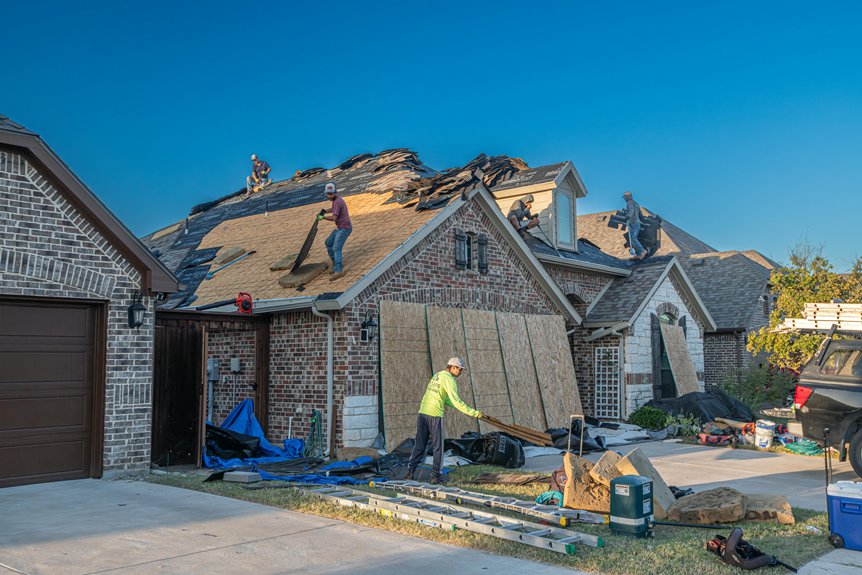If you’re considering a commercial roof replacement in The Colony, understanding your options is essential for long-term performance and energy efficiency. From traditional built-up systems to innovative green roofs, each solution offers distinct advantages suited to different building needs. Selecting the right material and contractor requires careful evaluation of durability, cost, and sustainability factors. Exploring these options thoroughly can help guarantee your investment results in a resilient, cost-effective roof that meets modern standards.
Built-Up Roofing (BUR) Systems
Built-Up Roofing (BUR) systems have long been a reliable choice for flat and low-slope roofs in The Colony. Historically, BUR has been utilized since the 19th century, establishing its reputation for durability and proven performance.
This roofing method involves multiple layers of bitumen alternated with reinforcing felts, creating a robust, weather-resistant barrier. Contact Top View Roofing for professional assessments and installation services to ensure optimal performance.
From an environmental perspective, traditional BUR systems use asphalt, which has a significant environmental footprint due to its petroleum-based origins and energy-intensive manufacturing.
However, advancements now enable the integration of recycled materials and environmentally friendly membranes, reducing ecological impact.
Understanding the historical significance and environmental considerations of BUR helps you make informed decisions about its suitability for your commercial roofing needs in The Colony.
Modified Bitumen Roofing
Modified bitumen roofing offers exceptional material durability and a long lifespan, making it a reliable choice for commercial roofs.
The installation process involves torch-applied or cold adhesive methods, ensuring a secure and weather-resistant membrane.
Its cost-effectiveness is balanced by straightforward maintenance requirements, providing a sustainable roofing solution with minimized long-term expenses.
Material Durability and Longevity
While modified bitumen roofing is known for its excellent durability, understanding its longevity requires examining its material properties. Its asphalt-based composition resists UV degradation, temperature fluctuations, and physical wear, making it suitable for long-term use.
The membrane’s inherent flexibility allows for expansion and contraction, reducing cracking over time. When considering solar integration, modified bitumen provides a reliable, heat-resistant surface that supports solar panel installations without compromising integrity.
Additionally, its aesthetic design options enable customization to match building aesthetics while maintaining durability. Proper maintenance, such as regular inspections and timely repairs, extends its lifespan further.
Installation Process Overview
The installation process for modified bitumen roofing involves precise, methodical steps to guarantee a secure and durable membrane. You should begin with a thorough roof inspection to assess surface integrity and identify potential issues.
Surface preparation is critical, ensuring the substrate is clean, dry, and free of debris. Next, you’ll apply a base sheet using adhesive or torch-applied methods, followed by the installation of multiple asphalt-saturated base plies.
Cap sheets are then layered on top, sealed with hot asphalt or self-adhesive techniques. Proper seam sealing is essential to prevent leaks.
Throughout the process, adherence to manufacturer guidelines is crucial. Finally, discuss warranty options with your contractor to ensure coverage for materials and installation, providing long-term protection for your investment.
Cost-Effectiveness and Maintenance
Considering its durability and ease of installation, modified bitumen roofing offers a cost-effective solution for long-term protection. Historically, trends show this membrane’s widespread adoption due to its proven reliability and low maintenance needs.
Its layered design enhances resistance to punctures and weathering, reducing repair costs over time. From an environmental impact perspective, modern formulations incorporate recycled materials and energy-efficient installation methods, decreasing ecological footprints.
Maintenance requirements are straightforward, involving periodic inspections and minor repairs that extend the roof’s lifespan. This combination of durability, low upkeep, and evolving eco-friendly practices makes modified bitumen roofing a financially sound option, especially when evaluating total lifecycle costs.
Its long-term efficiency aligns with both economic and environmental considerations, ensuring sustained performance in commercial applications.
Single-Ply Membranes (EPDM, TPO, PVC)
Single-ply membranes such as EPDM, TPO, and PVC are popular choices for residential roof replacements due to their durability, energy efficiency, and ease of installation. These membranes provide excellent resistance to weathering, UV radiation, and chemical exposure, ensuring long-term performance.
TPO and PVC offer advanced solar options, allowing integration with photovoltaic systems to enhance energy savings. Additionally, these materials typically come with all-encompassing roofing warranties, providing reassurance against manufacturing defects and membrane failures.
Their reflective properties contribute to lower cooling costs, aligning with energy efficiency goals. Proper installation is critical to maximize warranty coverage and membrane longevity.
Metal Roofing Solutions
Metal roofing solutions offer a durable and long-lasting alternative to membrane-based systems, making them an increasingly popular choice for residential roof replacements in The Colony. These systems provide excellent structural integrity, resistance to extreme weather, and minimal maintenance requirements.
Their reflective surface can enhance energy efficiency when integrated with solar panels, maximizing your building’s energy output. Additionally, metal roofs support rooftop gardens, thanks to their strength and compatibility with lightweight planting systems.
They also facilitate proper drainage, reducing water pooling and potential damage. Advanced coatings improve corrosion resistance and longevity, ensuring your investment endures over decades.
Spray Polyurethane Foam (SPF) Roofing
Spray Polyurethane Foam (SPF) roofing offers an innovative solution for residential and commercial roof systems by providing seamless, continuous insulation and waterproofing in a single application.
Its spray foam advantages include exceptional adhesion, minimal thermal bridging, and superior air barrier qualities, making it a highly durable choice.
The foam insulation benefits extend to improved energy efficiency due to its high R-value and ability to fill gaps and cracks thoroughly.
SPF roofing also contributes to structural reinforcement by adding a lightweight, seamless layer that resists leaks and weather damage.
This technology reduces installation time and ongoing maintenance costs, positioning it as a cost-effective, long-term roofing option.
Its all-encompassing waterproofing and insulation capabilities make SPF an increasingly popular choice for sustainable, high-performance roof systems.
Green Roof Options
Have you considered green roofs as a sustainable roofing solution? These systems integrate vegetation with your building’s structure, offering significant environmental benefits.
Green roofs facilitate solar integration by providing a natural platform that can support solar panel installation, optimizing energy efficiency. Additionally, they excel in stormwater management, absorbing rainfall and reducing runoff, which diminishes strain on drainage systems.
Their layered design includes a waterproof membrane, root barrier, and growing medium, ensuring durability and performance. Properly installed, green roofs extend roof lifespan and improve insulation, resulting in long-term cost savings.
As a strategic upgrade, they enhance your building’s sustainability profile while providing ecological and operational advantages. Green roof options stand as a forward-thinking choice for commercial properties seeking resilient, environmentally conscious roofing solutions.
Cool Roof Technologies
Cool roof technologies employ reflective materials and coatings to markedly reduce heat absorption, thereby lowering indoor temperatures and decreasing cooling energy demands. These advanced systems enhance a building’s energy efficiency by reflecting solar energy away from the roof’s surface, minimizing heat transfer into the interior.
Additionally, their design inherently improves wind resistance, offering superior durability in high-wind conditions common in The Colony. Implementing cool roof solutions can substantially reduce reliance on mechanical cooling, resulting in lower operational costs and a smaller carbon footprint.
Reflective Coatings and Roof Coatings
Reflective and roof coatings are essential components of modern roof replacement strategies, as they enhance a roof’s ability to reflect solar radiation and reduce heat transfer. These coatings improve solar reflectance, allowing the roof surface to bounce more sunlight and decrease heat absorption.
Additionally, they possess high thermal emittance, enabling effective heat dissipation from the roof surface. By optimizing these properties, reflective coatings lower cooling costs and mitigate the urban heat island effect.
Selecting coatings with high solar reflectance and thermal emittance values ensures better energy efficiency and extends roof lifespan. Proper application of these coatings requires adherence to technical specifications to maximize their performance.
Ultimately, integrating reflective and roof coatings into your roofing system delivers significant long-term energy savings and environmental benefits.
Choosing the Right Roofing Contractor
Selecting a qualified roofing contractor requires verifying their experience and credentials to guarantee they meet industry standards.
You should confirm they hold proper licensing and insurance to mitigate liability risks.
Additionally, obtaining transparent cost estimates helps prevent unexpected expenses and ensures clear communication throughout the project.
Experience and Credentials
Ensuring you choose a roofing contractor with substantial experience and verified credentials is essential for a successful roof replacement. Proven expertise guarantees that the project adheres to industry standards, directly impacting roof safety during installation and long-term performance.
Contractor qualifications serve as a benchmark for technical competence, safety protocols, and adherence to building codes. An experienced contractor understands the complexities of commercial roofing systems, enabling accurate assessments and effective solutions.
They also prioritize roof safety, minimizing risks to workers and your property. Verifying credentials such as certifications and industry memberships demonstrates a commitment to professionalism and ongoing training.
Selecting a contractor with the right experience and qualifications guarantees a smooth process, ideal results, and enduring durability for your new roof.
Licensing and Insurance
Verifying that your roofing contractor holds valid licensing and thorough insurance coverage is critical to safeguarding your property and investment. Proper roof licensing ensures the contractor complies with local regulations and industry standards, demonstrating legitimate expertise and accountability. Confirm that their license is current and issued by recognized authorities.
Equally important is verifying comprehensive insurance coverage, including workers’ compensation and liability insurance, to protect against potential accidents or damages during the project. Without proper insurance, you could be held liable for injuries or property damage caused by the contractor’s team.
Always request proof of licensing and insurance documentation before proceeding. This due diligence minimizes legal and financial risks, ensuring your commercial roof replacement is handled professionally, safely, and in accordance with all regulatory requirements.
Transparent Cost Estimates
Obtaining a transparent, detailed cost estimate is essential to making an informed decision when choosing a roofing contractor. A thorough estimate should include a comprehensive roof inspection to identify underlying issues and accurately assess the scope of work.
It must also specify material costs, labor, and potential additional charges. Confirm the contractor clearly outlines warranty coverage, detailing what’s included and for how long, to protect your investment.
Transparency in these areas helps you compare bids effectively and avoid hidden fees. Trustworthy contractors provide detailed breakdowns, enabling you to evaluate the quality of materials and workmanship.
Ultimately, a precise estimate facilitates informed decision-making, ensuring your commercial roof replacement aligns with your budget and long-term performance expectations.
Conclusion
Selecting the appropriate commercial roofing system in The Colony involves evaluating durability, energy efficiency, and sustainability options. By partnering with experienced, licensed contractors, you guarantee proper installation and long-term performance. Whether you choose built-up roofing, metal, or green roofs, each solution offers distinct advantages for weather resistance and energy savings. Make informed decisions based on your building’s needs to optimize longevity, environmental impact, and cost-effectiveness for your commercial property. For more information on how to schedule your free roof inspection, call us at (405) 543-2920 or visit us online at Top View Roofing.


















